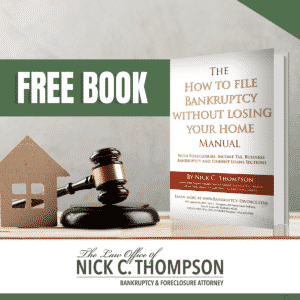This post explains how to manage student loan collections and get out of default both with and without bankruptcy. It explains in a few words and a couple of minutes what you need to know while giving you a plan of action. Each part of this can be expanded as a topic if you need to know more about that section in depth.
How to Manage Student Loans Collections
⎆ Private student loan collections and bankruptcy.
I often file Chapter 13 cases to stop private student loan collections. Bankruptcy may not discharge the private student loan but it can still kill it. First, let’s look at a few facts. So, the private student loan was made by a bank or lender. Now, imagine not being repaid. Then imagine spending money for an attorney to sue the student to get your money back. When that happens, the student files a Chapter 13 in which the lender or bank is repaid zero for 5 years. That’s exactly what happens most of the time when my clients get sued for their private student loans.
There is a statute of limitations for private student loans while there is not for government loans. If a private student loan does not collect for 3, 5, 10, or 15 years you may have run the statute of limitations for the private loan. However, this depends on your state. In Kentucky, the statute of limitations went down in 2014 from 15 to 10 years. Time in bankruptcy is not added to the time you have to wait out.
But filing Chapter 13 normally keeps the bank from ever suing to collect again. The lawsuit is eventually dismissed for the lack of prosecution in a state case. Lenders for private student loans have to sue to collect. Government student loans don’t have to sue to garnish wages and bank accounts – they just go ahead and do it. Government student loans can even garnish your social security check without going to court.
⎆ Government student loan collections and bankruptcy.
Amazingly, sometimes Chapter 13 is the best tool to modify government student loans though. This is especially true if you are being sued. But, you never want a student loan judgment to happen. That is unless you want a judgment that is collectible for 20 years in Kentucky and is renewable for another 20 years and is repeatedly renewable.
Instead, you can file Chapter 13 bankruptcy, the collections stop, and garnishments don’t happen. Bankruptcy also stops the judgment from being issued in state court. With government student loans the collections stop while you are in Chapter 13 and you get relief for 5 years.
Processing a rehabilitation or consolidation of the student loan becomes easier during bankruptcy. If you are a candidate for undue hardship but the case is borderline, filing for rehabilitation or consolidation may allow you to get the undue hardship. Additionally, if the terms the lender or servicer offers are unreasonable and cause hardship, then, the loan becomes a candidate for an undue hardship discharge. It may also force the Department of Education to give you reasonable terms.
In bankruptcy, a student loan is not discharged unless you get an undue hardship discharge. You can only get undue hardship by filing a separate lawsuit called an adversary proceeding. Getting an undue hardship is not impossible – it is just rare and difficult to do. Only about 500 people get an undue hardship discharge every year. We do have a checklist if you need to analyze your case.
⎆ The history of bankruptcy and student loan collections.
Originally student loans in the 1970s were just as dischargeable as credit card debt. In the 80s-90s, you were required to wait for three and later seven years before students could discharge a student loan. During the late 90s government student loans were made non-dischargeable. In 2005, banks contributed enough to congress to make the private student loans non-dischargeable unless you could get undue hardship.
Since about 2012 Congress has repeatedly tried to bring back private student loan discharges and better programs. Then, in 2020, most of the Democratic candidates made promises to improve student loan repayment programs. But since 2016, Trump’s Department of Education director has refused to even process fraud and disability discharges. One judge even threatened her with contempt of court after she was ordered to discharge these loans and failed to do so. However, as of January 1, 2018, President Trump made the death and disability discharge tax-free. Never-the-less, all this leaves is more of a question than an answer about how to manage student loan collections.
⎆ Bankruptcy as a tool to manage student loan collections.
When I prepare a bankruptcy for a student loan debt I normally place private student loans as being paid outside the plan. In Chapter 13 the private loans are then paid zero for 5 years. After being paid zero for five years private lenders usually go pester someone else. My client’s car loans etc. are paid inside the Chapter 13 plan with a very small repayment to unsecured debts.
⎆ Income-based repayment plans to cure student loan defaults.
Government student loans should be in an income-based repayment plan of some kind there are about 8 different programs like PAYE, REPAYE, IBR, etc. You normally need to be in an income-based plan to make your plan payments affordable. Income-based repayment plans are on a sliding scale from a zero payment to 10% of family income. Some programs do not use family income and only calculate your income. Also, you need to be in the correct program or this can be costly, especially if your spouse makes most of the income.
Often the servicer places you in the program which profits them the most, not what is best for you. There is a program that calculates the advantage of all eight programs and then you simply choose what you like best. You can check it out at studentloanify.com. If you use a qualified attorney to process your application you have a chance to be placed into the best program for you. Please beware that just like there were IRS tax settlement and debt settlement companies which were scams there are also student loan services that will not deliver what they promise.
A word of caution, you must never accept a forbearance or deferment if you are in an income-based repayment plan. If your income is zero your payment is zero and it counts as one of the years you repaid the student loan debt.
Most income-based loans require 20 years of repayment and working for a non-profit may allow you to repay the student loan in just 10 years.
⎆ Rehabilitation to cure student loan defaults.
Servicers love rehabilitation because the payments you pay in rehabilitation are often charged late fees and interest. They collect a percentage of these payments which is why they often set such high payments. In other words, they do it simply because it increases their profits.
Government Student Loan Rehabilitation requires 9 of 10 on-time payments. If you are in default you should normally work to get out of default with rehabilitation or some combination of rehabilitation and consolidation. Remember, rehabilitation is only allowable one time.
The benefit to the borrower in rehabilitation is that it removes the default from your credit report. Often this qualifies you for a home or better car loan rates by improving your credit score. This seems to happen overnight on completion of the 9 rehabilitation payments while your score normally improves. Either you are now on time or your account notation shows you made these payments on time for the prior 15 years. Rehabilitated federal direct loans are subject to collection fees and costs but it is no longer added to your loan balance.
Rehabilitating and consolidating student loans is not the practice of law. I do not process applications for rehabilitation or consolidation. Josh Cohen is recognized by the National Association of Consumer Bankruptcy Attorneys for his work in rehabilitating and consolidating student loans. He can process your student loan application to get you the best deal but he does charge for his services.
⎆ Is it really a non-dischargeable student loan?
Always remember the servicer of your student loan never works for you. You must also know that the bank’s lawyer does not work for you. Rather, they get their pay for collecting the principal, late fees, and interest. In addition, the bank’s servicers and attorneys won’t tell you how to sue the bank. They also won’t tell you how to not pay the debt.
Interestingly, unless the debt is in default, the Fair Debt Collection Practices Act does not apply to the servicer. What they can do is legally lie to you. Also, the FDCPA act does not apply to the Department of Education. Instead, it only applies to a debt collector collecting consumer debt that is in default.
The debt the servicer lender or debt collector is attempting to collect might be a student loan that is not protected from bankruptcy. However, a loan for tuition is dischargeable. Also, a student loan by the military to a serviceman is often just as dischargeable as a credit card. But there is still one military program student loan program that is never dischargeable. Normally, only qualified student loans are protected. On the other hand, most air pilot and cake baking schools don’t meet the qualifications. In fact, there is a section of the social security code that defines which loans are protected.
⎆ Servicer conflict of interests.
Anything you pay the servicer will go to late fees and interest so they can collect up to 40% of what you are paying. If the servicer processes a rehabilitation or loan consolidation they also get paid. What’s more, if they call or write a letter they receive payment for that! So do not believe that the servicer works for your best interests.
However, interestingly, servicers get sued for putting students into the worst student loan programs. Then, they respond that they don’t work for the students. Rather, they work for the bank or the Department of Education. So, what happens is servicers like Navient and Sallie Mae have no duty to give the student the best deal. Instead, they get paid more by giving students the worst loan possible and reward their workers based on just that.
 Resources for Student Loans
Resources for Student Loans
How to Stop Student Loan Wage Garnishment
Current Student Loan Interest Rates
How to Stop Student Loan Collections and Garnishments with Bankruptcy
Bankrupt or Discharge Student Loans
Student Loan Rehabilitation Law New Regulations
Do you need help managing your student loan? Contact my office right away to start the conversation. Nick C. Thompson, Attorney: 502-625-0905.



